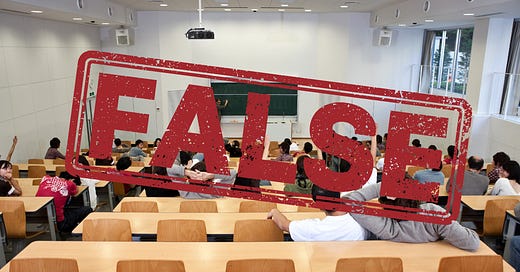FACT CHECK: International Students Not to Blame for Australia's Rental Crisis, Large-Scale Study Confirms
FACT CHECK: International Students Not to Blame for Australia's Rental Crisis, Large-Scale Study Confirms

CLAIM: Rental crisis due to increase of International Students
RATING:
Key Findings
International students make up only 4-6% of Australia's rental market
Statistical analysis shows no significant relationship between international student numbers and rental costs
Housing supply issues and changing household demographics are major factors in rental affordability crisis
Detailed Analysis
A groundbreaking study from researchers at the University of South Australia has conclusively demonstrated that international students are not responsible for Australia's rental crisis, despite political narratives suggesting otherwise.
The comprehensive research, published in the peer-reviewed journal Higher Education, examined data collected across 76 time points from 2017 to 2023 at the national level and 79 time points from 2017 to 2024 at the capital city level.
"Our findings challenge the politicized connection between international student numbers and rental costs," said lead researcher Professor Guanglun Michael Mu, who conducted the study with colleague Dr. Hannah Soong.
The study found that at the national level, international students actually contributed negatively to rental costs when controlling for inflation and vacancy rates. For every 10,000 increase in international students, weekly rental costs decreased by approximately $1-2.
Statistical Evidence
The researchers employed hierarchical regression analysis, controlling for factors such as rental inflation and vacancy rates.
Key findings include:
No statistically significant correlation between international student numbers and rental costs in any capital city after the COVID-19 pandemic
Rental inflation and vacancy rates explained a much larger proportion of variance in rental costs
Even before the pandemic, international student numbers explained only a small percentage (typically 2-7%) of rental cost variance in cities where a relationship was found
"Post COVID, throughout Australia, and in all the capital cities we researched, there was no statistically significant correlation between international student numbers and the rental costs," Professor Mu told ABC News.
Supporting Research
The University of South Australia's findings align with reports from the Student Accommodation Council, which notes that international students make up only about 4-6% of Australia's rental market.
The SAC's research, supported by economic analysis firm Mandala, found that approximately 39% of international students live outside the private rental market entirely—25% with family/friends or in university accommodation, and 14% in purpose-built student accommodation (PBSA).
A Domain report indicates that the government's proposed cap on international student numbers would result in only about a $5 weekly decrease in average rents in metropolitan areas—less than a 1% impact.
Real Causes of the Rental Crisis
Multiple sources identify the following as the primary factors behind Australia's rental crisis:
Insufficient housing supply and construction delays
Shift toward smaller households and single-person living
Repurposing of spare bedrooms into home offices due to remote work
Rising construction costs and skills shortages
Planning restrictions and inadequate urban infrastructure
Conversion of long-term rentals to short-stay accommodations
"The rise of smaller and solo-person households, intrastate migration and a trend to re-purposing second bedrooms into home offices are all impacting the supply and affordability of rental homes across the country," noted the Student Accommodation Council.
Political Context
The findings come as Australia's rental crisis has become a politically charged issue, with some politicians suggesting international student caps as a solution to housing affordability problems.
In a budget speech on May 14, 2024, Australian Treasurer Jim Chalmers claimed that international student enrollments created "pressure on prices and rents." Opposition Leader Peter Dutton similarly proposed "to relieve stress on rental markets" by reducing "the excessive number of foreign students."
More recently, in September 2024, Mr. Dutton described international students seeking visa extensions as the "modern version of boat arrivals," drawing criticism from former immigration department deputy secretary Abul Rizvi, who called the comparison "nonsense."
Economic Implications
The Student Accommodation Council warns that capping international student numbers could have significant economic consequences, including:
$4.1 billion reduction in GDP from lost economic activity
22,000 job losses nationwide (direct and indirect)
$600 million annual revenue reduction for universities
International education is Australia's fourth-largest export, contributing approximately $48-63 billion annually to the economy and supporting over 335,000 jobs.
Expert Perspectives
Former Treasury head Martin Parkinson told the Australian Financial Review that international students are not competing for the same properties as locals, supporting the study's findings.
"We are empiricists, which means we are researchers, not tied to any political agenda. Not tied to any strategies of the university in terms of our research. All we are looking for is data and evidence," Professor Mu emphasized to ABC News.
Student Accommodation Council Executive Director Torie Brown stated, "There are more domestic students in rental homes than international—yet no one is suggesting we ban share-houses for local university students."
Solutions Proposed
Instead of student visa caps, experts suggest addressing the housing crisis through:
Accelerating housing construction
Expanding purpose-built student accommodation
Streamlining planning systems for housing development
Addressing tax barriers to investment in student accommodation
Implementing PBSA-specific legislation in residential tenancy acts
The Student Accommodation Council estimates Australia needs to add 66,000 new PBSA beds by 2026 to maintain the current proportion of international students in purpose-built accommodation.
Conclusion
The comprehensive analysis from the University of South Australia provides robust evidence that international students are not driving Australia's rental crisis. This research, reinforced by additional data from industry bodies and independent experts, suggests that policy solutions should focus on addressing broader housing supply issues rather than targeting international student numbers.
Research Sources: University of South Australia, Student Accommodation Council, Property Council of Australia, Domain, ABC News, SBS News, Realestate.com.au, The PIE News.
At Mencari, we think it's super important to fact-check to fight misinformation and disinformation and to keep citizens and voters informed and educated.
We invite the public to send us their feedback and requests for fact-checks at factcheck@readmencari.com.
Got a News Tip?
Contact our editor via Proton Mail encrypted, X Direct Message, LinkedIn, or email. You can securely message him on Signal by using his username, Miko Santos.
More on Mencari
5 - Minute recap - for nighly bite-sized news around Australia and the world.
Podwires Daily - for providing news about audio trends and podcasts.
There’s a Glitch - updated tech news and scam and fraud trends
The Expert Interview - features expert interviews on current political and social issues in Australia and worldwide.
Viewpoint 360 - An analysis view based on evidence, produced in collaboration with 360Info
Mencari Banking - Get the latest banking news and financials across Australia and New Zealand
The Mencari readers receive journalism free of financial and political influence.
We set our own news agenda, which is always based on facts rather than billionaire ownership or political pressure.
Despite the financial challenges that our industry faces, we have decided to keep our reporting open to the public because we believe that everyone has the right to know the truth about the events that shape their world.
Thanks to the support of our readers, we can continue to provide free reporting. If you can, please choose to support Mencari.
It only takes a minute to help us investigate fearlessly and expose lies and wrongdoing to hold power accountable. Thanks!








